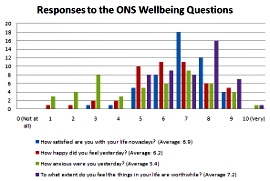What difference will wellbeing make? A discussion with Professor John Helliwell
Professor Helliwell kicked off by explaining why the government's decision to measure wellbeing and the four ONS questions were so exciting.
"From April next year, we'll start measuring our progress as a country, not just by how our economy is growing, but by how our lives are improving; not just by our standard of living, but by our quality of life."
Speech given by the Prime Minister on wellbeing on 25 November 2010
What difference would wellbeing make to public policy?
...a lot, according to the speakers at the Institute for Government's seminar on 3 March:
- Professor John Helliwell - Emeritus Professor, University of British Columbia
- Dr David Halpern - Behavioural Insight Team, Cabinet Office
- Irene Lucas - Director General, Department of Communities and Local Government, and former Chief Executive of South Tyneside Council
- Jo Swinson MP - chair of the all-party Parliamentary group on wellbeing
Professor Helliwell
Professor Helliwell kicked off by explaining why the government's decision to measure wellbeing (announced by David Cameron in November) and the four Office for National Statistics (ONS) questions (see graph below) were so exciting.
Evidence from elsewhere showed that people answered these questions in a consistent way – with life evaluation questions providing the most robust answers.
There were important lessons for policy makers from the wellbeing research:
- The need to focus on the positives – policy usually focuses on mitigating negatives rather than promoting positives
- Humans are essentially social creatures – people are happier when doing things together
- The importance of trust, belonging and social capital - workplaces where people did not think in terms of "bosses" had better morale than those where they did. Prof Helliwell cited an example whereby moving up one point in a ten point scale of whether management could be trusted had the same effect on life evaluation as a one third increase in income
Policy interventions designed with wellbeing in mind could produce hugely beneficial results.
He gave the example of an elder care project in Exeter where half the inhabitants of a new facility were given the opportunity to design their social spaces and the other half had these spaces designed by professionals. The inhabitants who had designed their own floor were not only happier, but also used their social spaces 50% more than the others.
In Singapore, major benefits had been achieved through a transformational approach to prisoner rehabilitation through engaging the community – with recidivism rates almost halved and a large increase in workplace satisfaction among prison officers.
David Halpern
David Halpern noted that a lot of other countries were now getting interested in measuring wellbeing. The prospect of the new data opened up really exciting opportunities – this could be incorporated in policy evaluations.
Work was going on to incorporate wellbeing into the Treasury Green Book – and the large size of the ONS sample meant that we would have data down to local level.
The data would not only help government. It would also help the public – and it would be really interesting to see if people changed their own behaviour when, for example, the links between behaviour and wellbeing could be empirically demonstrated.
Irene Lucas
Irene Lucas focused on her practical experience of trying to improve wellbeing in South Tyneside. She singled out three specific initiatives:
- creating a "sense of place" - by capturing and celebrating the heritage of the area.
- working with faith groups to tackle isolation among older people – by getting people to visit to read a newspaper, do a suduko, take round some bananas or fish and chips. The finding was that these acts of kindness were beneficial not just to the person visited, but also to the visitor.
- focus on building resilience skills among 9-11 years olds - this had a significant upfront cost – around £ 250,000 to train the teachers. But at £147,000 to lock up one young offender for one year, the potential for payback was enormous.
Jo Swinson MP
Jo Swinson MP pointed out that there were some sceptics who thought that looking at wellbeing was a waste of money – even though it was what people were most concerned with.
This was not destined to be a political football – people across the spectrum were in agreement, but the media would give politicians a hard time. There were lots of questions – but the real value would come from drilling down beneath the headline numbers and in measuring wellbeing before and after policy interventions.
This had potential too to change political discourse and give legitimacy to new issues – and, instead of being a matter of argument between politicians, there would be data showing how people actually feel.
So how was the wellbeing of our audience?
At the event we decided to give participants a chance to rate themselves on the new ONS wellbeing questions. On an unrepresentative sample of 49 people, we got the following results: [click to enlarge]
More information
- Topic
- Policy making
- Keywords
- Health
- Publisher
- Institute for Government
